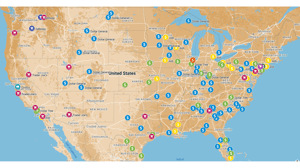Addressing Fraud
Several years ago, concerns about fraud and duplication caused a number of food retailers to reject coupons that originated online. The number of retailers taking that action has largely diminished, though Foodtown stores, such as one in Denville, N.J., stopped accepting Web coupons this year. In February, the Association of Coupon Professionals (ACP), Drexel Hill, Pa., developed a free poster designed
November 16, 2009
Michael Garry
Several years ago, concerns about fraud and duplication caused a number of food retailers to reject coupons that originated online. The number of retailers taking that action has largely diminished, though Foodtown stores, such as one in Denville, N.J., stopped accepting Web coupons this year.
In February, the Association of Coupon Professionals (ACP), Drexel Hill, Pa., developed a free poster designed to assist store personnel in distinguishing legitimate from illegitimate Internet coupons. The latter, for example, would have such elements as free or high value offers, obvious alterations and unusually long expiration periods. The ACP has so far distributed more than 4,000 of the posters, said John Morgan, executive director.
“Retailers can and do reject Internet print-at-home coupons and regular paper coupons if they don't adhere to the retailer's coupon policy, but it is not a widespread issue,” Morgan said.
J.P. Beauchamp, senior vice president, consumer and shopper insights division, Information Resources Inc., Chicago, pointed out that allowing shoppers to download online and mobile coupons to loyalty cards, rather than print them, helps to eliminate fraud and duplication.
Coupons.com allows coupons to be either printed or downloaded, but not both, to prevent someone from “stacking” or duplicating offers, said Steve Boal, chief executive officer. The printed online coupons on Coupons.com are “digitally signed” to enable the company to track and prosecute duplication fraud, he noted.
Cellfire allows shoppers to “tell a friend” about one of its online or mobile coupon offers. However, the recipient would need to be a Cellfire user and reside in an area where the coupon is available.
“Our advertisers designate limits on the amount of coupon uses or redemptions each person can individually have,” said Cellfire spokesman Dan Kihanya. “Additionally, advertisers can set caps on the number of overall redemptions that are allowed across all users.”
About the Author
You May Also Like






